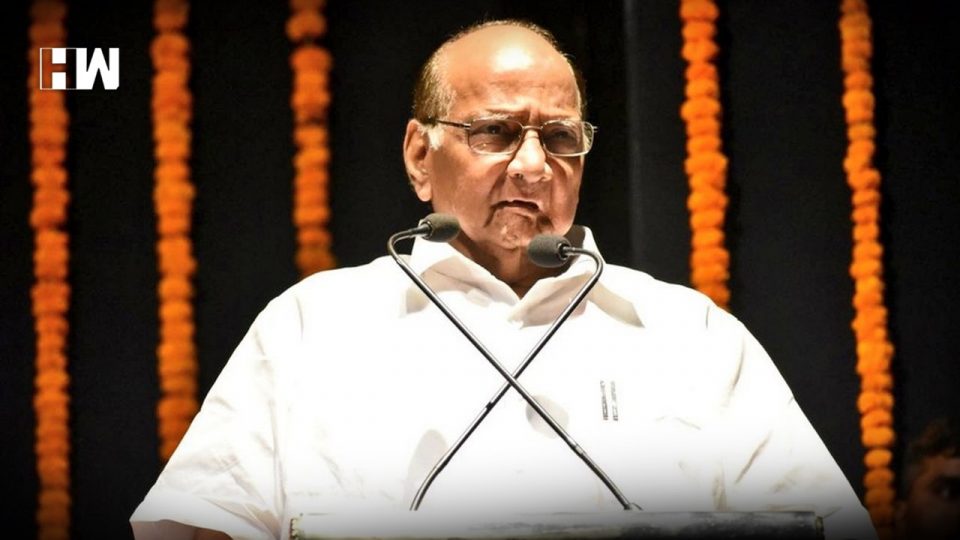The Post of Prime Minister is constitutional so the dignity of this post should be maintained
*Once an importing country has become an exporting country*
* Scarcity of foodgrains when I assumed the post of Agriculture Minister*
*When I was Agriculture Minister, the country became self-sufficient in food grains*
*When I was the Agriculture Minister, I took a big decision to waive the farmers’ loans of Rs 62,000 crore
*An important decision changed the face of the country’s agriculture sector*
NCP chief Sharad Pawar on Saturday hit back at Prime Minister Narendra Modi saying that during his stint as the union agriculture minister India’s agriculture sector was not only transformed as once an importing country became an exporting one and also turned itself self sufficient in food grains. Pawar slammed the Modi led government for its switch on policy in agriculture and claimed that it has not only hit the sector badly but adversely impacted the farmers. Pawar was speaking two days after Modi at Shirdi on Thursday had claimed that as the agriculture minister Pawar had done little when compared to the 9 year rule of the BJP led government at the Centre.
He claimed that Modi is targeting him in view of growing discontent against BJP. He said though he has data with regard to the elections being held in five states, he has yet to compile the similar data to give his opinion about the Lok Sabha elections slated for 2024.
‘’The post of Prime Minister is a post of prestige. The PM’s post is constitutional so its dignity should be maintained. So he should give information properly. It seems he was not briefed properly. I was the Agriculture Minister from 2004 to 2014. When I took office, wheat had to be imported from America. Then we made some decisions assuring a guaranteed price of wheat, rice, soybeans while cotton price doubled. Many ambitious programs were undertaken during that period,’’ said Pawar.
‘’When the UPA was in power comprehensive and far-reaching schemes were launched to bring about transformation in agriculture and allied sectors,’’said Pawar.
‘’From 2004 to 2014, I was responsible for the post of Agriculture Minister of the country. In 2004, there was a shortage of food grains in the country. On the first day after taking oath, I had to make a bitter decision. The country had to import wheat from America. The stocks in the country were not in a good condition. That file came to me. I did not sign that file. I was upset that I had that file lying around saying despite an agricultural country it had to import food grains. Two days later, the then Prime Minister Manmohan Singh called me saying that in 3 to 4 weeks we may face a problem. So I signed the file,’’ he explained.
Pawar also said that many important decisions were taken in the farmers’ interests saying that the government declared loan waiver scheme of Rs 62,000 crore to prevent farmers’ suicides. It was decided to set up a separate corporation for fishing. ‘’During our tenure, the farmers got a good guarantee. Farmers in Maharashtra benefited from the subsidy given to farmers. I started the National Horticulture Mission and during my tenure the production of vegetables also increased,’’he added.
‘’The increase in MSP of food grains has encouraged the farmers. The country became self-sufficient in food. India is the world’s largest producer of rice and second largest producer of wheat.India also ranked second in the production of sugarcane, cotton, jute, milk, fruits, fish and vegetables. For example, fruit production went up from 45.2 million tonnes to 89 million tonnes. Production of vegetables increased from 88.3 million tonnes to 162.9 million tonnes,’’said Pawar.
Pawar read out a letter from international organisations including the International Rice Research Institute which hailed the country’s performance in rice production during Kharif 2011. Similarly, Food and Agriculture Organisation also congratulated the UPA government for its achievements in stabilising food prices, improving public food distribution of food grains for ensuring access to food and nutrition , but especially the achievement of exceeding , for the first time in history , 100 million tons of rice production and 250 million tons of food grains.
Further, Pawar mentioned praise showered at him by Modi himself during his visit at Baramati and also during his 75th birthday for his stellar contribution to the agriculture sector.
Failure of The Modi Government
In the run-up to the 2014 Lok Sabha elections, Modi had promised to fix the MSP of foodgrains and Agricultural produce at one-and-a-half times higher than the cost of production as recommended by the Swaminathan Commission in 2006. But he didn’t keep the promise. The 2016 budget had promised to double farmers’ income by 2022. Now the year 2023 is over. Nothing is doubled. ‘’In 2021, four farmers who were protesting peacefully in Lakhimpur Kheri (Uttar Pradesh) were run over by a vehicle in the convoy of the state minister of state for home affairs. Modi ji never took any notice of the farmers who had been protesting for many months against the farm laws,’’ he claimed.
40% Export Duty on Onion be withdrawn
Last year in the same month, the Centre had banned export of sugar without the Centre’s permission for a period of one year. However, the Centre has again extended the ban for an indefinite period. This will have a direct impact on remunerative prices to sugarcane growers.
Similarly, the Centre imposed 40 percent export duty on onions on August 19, 2023. Despite repeated protests from onion growers, it has not been withdrawn.
As an independent media platform, we do not take advertisements from governments and corporate houses. It is you, our readers, who have supported us on our journey to do honest and unbiased journalism. Please contribute, so that we can continue to do the same in future.

